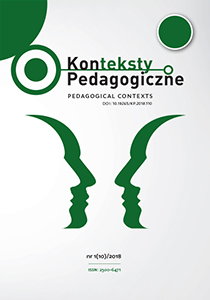Abstract
The aim of this paper is to analyse the relation between media activity of university students and the quality of their participation in academic offer. The huge potential of media is noticed in field of education and how human relations are shaped. At the same time, they are criticized due to their content. In one of the irst places critics refer to the submission of media to popular culture and entertain-ment, promoting of immaturity of the recipients and in consequences withdrawn of adolescents from the public sphere and weakens their engagement into “work ethos”. To what extent are those observations empirically confirmed? I shall discuss this issue on the example of results of research among university students.
References
Barber, B. (2008). Skonsumowani. Jak rynek psuje dzieci, infantylizuje dorosłych i połyka obywateli. Warszawa: Warszawskie Wydawnictwo Literackie MUZA.
Bauman, Z. (2009). Konsumowanie życia. Kraków: Wydawnictwo Uniwersytetu Ja-giellońskiego.
Bauman, Z. (2006). Praca, konsumpcjonizm inowi ubodzy. Kraków: Wydawnictwo Uniwersytetu Jagiellońskiego.Bourdieu, P. (2009). Rozum praktyczny. Oteorii działania, przeł. J. Stryjczyk. Kraków.
Bourdieu, P. i Wacquant, L. (2001). Zaproszenie do socjologii refleksyjnej, przeł. A. Sa-wisz, Warszawa: Oficyna Naukowa.
CITAMS (Communication, Information Technologies, and Media Sociology), Mission, https://citams.org [dostęp: 18.03.2017].
Dudzikowa, M., Wawrzyniak-Beszterda, R., Jaskulska, S., Marciniak, M., Boch-no, E., Bochno, I. i Knasiecka-Falbierska, K. (2013). Oblicza kapitału społecznego uni-wersytetu. Diagnoza – Interpretacje – Konteksty. Kraków: Oficyna Wydawnicza „Impuls”.
European Commission/EACEA/Eurydice (2012). Developing Key Competences at School in Europe: Challenges and Opportunities for Policy. Eurydice Report. Luxembourg.Giddens, A. (2008). Socjologia, przeł. A. Szulżycka. Warszawa.
Goban-Klas, T. (2005). Media ikomunikowanie masowe. Warszawa: PWN.
Kiełkiewicz-Janowiak, A. (2011). Intergenerational communication and media in Poland. A perspective of adolescent media consumers. W: M. Kaczmarek (red.), Health and Well-Being In Adolescence. Part II: Media (s. 53–73). Poznań: Bogucki Wydawnictwo Naukowe.
Klein, N. (2004). No logo, przeł. H. Jankowska, M. Makaruk. Kraków.
Klichowski, M., Marciniak, M. (2013). The Paradox of Commodification of the Body in a Society of Consumption and Cyborgization. Studia Edukacyjne, 29, 153–167.
Klichowski, M. i Smaniotto Costa, C. (2015). How do Pre-service Teachers Rate ICT Opportunity for Education? A Study in Perspective of the SCOT Theory. Kultura i Edukacja, 4, 152–168.
Kluszczyński, R.W. (2008). Przeszłość – pamięć – tożsamość. Doświadczenie medial-ne jako fundament hybrydycznej tożsamości. W: A. Zeidler-Janiszewska i R. Nycz (red.), Nowoczesność jako doświadczenie. Dyscypliny. Paradygmaty. Dyskursy (s. 170–184). Warszawa: Wydawnictwo Szkoły Wyższej Psychologii Społecznej „Academica”.
Krasnodębska, A. (1997). Orientacje aksjologiczne młodzieży akademickiej. Opole: Wydawnictwo Uniwersytetu Opolskiego.
Kwiatkowska, D. i Dąbrowski, M. (2012). Dojrzałość technologiczna uczniów w świet-le wyników badań ankietowych. E-mentor, 1(43), http://www.e-mentor.edu.pl [do-stęp: 18.03.2017].
Lepa, A. (2010). Pedagogika mass mediów. Łódź: Archidiecezjalne Wydawnictwo Łódzkie.
MacCannell, D. (2005). Turysta. Nowa teoria klasy próżniaczej, przeł. E. Klekot, A. Wie-czorkiewicz. Warszawa: Warszawskie Wydawnictwo Literackie MUZA.
Marciniak, M. (2015). Media activity and the identity of adolescents in the society of consumption. W: H. Krauze-Sikorska i M. Klichowski (red.), The Educational and Social World of a Child: Discourses of Communication, Subjectivity and Cybor-gization (s. 462–477). Poznań: Wydawnictwo Naukowe Uniwersytetu im. Adama Mickiewicza.
Marciniak, M. (2012). Orientacje konsumpcyjne – bariera w rozwoju kapitału społecz-nego młodzieży akademickiej? Doniesienie z badań. Studia Edukacyjne, 22, 227–256.
Marciniak, M. (2015). Orientacje konsumpcyjne młodzieży akademickiej. Perspektywa Baumanowska, wyd. 2. Kraków: Oficyna Wydawnicza „Impuls”.
Melosik, Z. (2013). Kultura popularna i tożsamość młodzieży: w niewoli władzy i wolno-ści. Kraków: Oficyna Wydawnicza „Impuls”.
Ritzer, G. (2010). „Płynna globalizacja”: zastosowanie i krytyka pojęcia płynności Z. Baumana. W: A. Chrzanowski, W. Godzic i A. Zeidler-Janiszewska (red.), Zro-zumieć nowoczesność. Księga Jubileuszowa Zygmunta Baumana (s. 221–241). Łódź: Wydawnictwo Officyna.
Romaniszyn, K. (2007). Rzecz o pracy i konsumpcji. Analiza antropologiczna. Kraków: Zakład Wydawniczy „Nomos”.
Żabicki, P. (2007). Technologiczna codzienność. Internet – Bank – Telewizja. Warszawa: Wydawnictwo TRIO.
In accordance with the recommendation of the Ministry of Science and Higher Education, which aims to counteract the practice of “ghostwriting” and “guest authorship,” all authors submitting their text for publication should attach an author’s statement which declares the contribution of each of the authors to the article. The printed and signed statement should be delivered by mail or other means to editor-in-chief Joanna Skibska or sent in the form of a scan to the following e-mail address: redakcja@kontekstypedagogczne.pl. The authors will not receive remuneration for publishing their papers. The editors reserve the right to make minor editorial changes to the articles which will not affect the substance of the article. We encourage all authors to prepare their articles in accordance with the guidelines for manuscript preparation. Download pdf file.
Authors transfer all copyrights and grant the journal the right of first publication with the work simultaneously licensed under a Creative Commons Attribution License that allows others to share the work with acknowledgement of the work's authorship and initial publication in this journal. All authors agree to the publishing of their email addresses, affiliations and short bio statements with their articles during the submission process.

